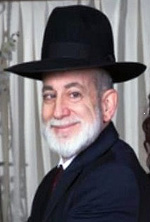By Rabbi Yaakov Marks

SAN DIEGO –The Mishkan (the portable Tabernacle) was built to be a place where G-d could dwell, presenting a more concentrated manifestation of Himself than He emanated to the rest of the world. It was the place where the people could go, with the proper preparation, to communicate with G-d with purity of body and thought. The vessels of the Mishkan were made with supreme holiness and the offerings were brought with great sanctity. Anyone who witnessed the Mishkan and the services performed there left with a feeling of awe and humility.
“And they will take for You pure pressed olive oil for the lighting (of the menorah)” (Exodus 27:20)
Specially prepared oil was crafted for the daily lighting of the Menorah (the golden candelabra) and the daily meal offerings. The oil for the Menorah consisted of only the first drop of carefully-pressed oil from the finest olives. Those olives then were tenderly crushed and pressed to produce a very pure oil for the meal offering. Even though this oil was pure and holy enough for the meal offerings, it was not acceptable for use in the Menorah.
Normally, people use the finer oil in the food to be eaten while the poorer- quality oil is burned in their lamps. Why would G-d require the purer, higher quality, more expensive oil to be burnt in the Menorah, and the less- expensive oil used for the meal offering which is eaten by the Cohen? Why is G-d so meticulous about the oil burnt in the Menorah? Once the oil is poured into the golden cups of the Menorah, no one would have been able to discern the quality of the oil.
To answer this, we first need to understand what motivates us. A child applies the opinions of others towards himself to evaluate his personal sense of worth. He compares himself to others in order to internally measure and weigh his own value. This is so important to a young child, that if his positive behaviors are not properly noticed and praised, he will react in a negative, inappropriate manner to get the validation he needs. In addition, young children are attracted to physical pleasures and will spend a great amount of time and effort to attain that pleasure. Both of these drives shapes the child’s personality and ability to relate to others throughout his early, critical formative years.
The light of the Menorah is a metaphor for the learning of Torah and the intellect. The meal offering represents a person’s livelihood and food. With the reversing of where the purer oil is to be used, G-d teaches us profound and vital lessons. A person must emulate the pure oil that was reverently placed in the golden cup. Once placed in the cup, no one can see or evaluate it, yet that pure oil knows it is the purest and finest quality of oil. G-d is telling us we must not worry what others say about us; inner purity and scrupulous behavior form the essence of who we really are. Self-worth is extremely important, and with that, we will thrive. We must break free of the immature need to compare ourselves to others and of basing our true value on their opinions.
G-d is also telling us that we must spare no effort or reasonable expense in our pursuit of Torah learning and intellectual growth. Any Torah learned and knowledge gained defines us and is eternal. Food, on the other hand, is important, but G-d warns us not to spend extra time and money obtaining finer and unnecessarily abundant quantities of food. Once food is eaten, it is gone and eventually must be expelled from the body. Furthermore, the less refining is done to the food the more nutritious it is. G-d is telling us to break away from that once-necessary drive for physical pleasure, so essential a focus for young children, transferring it instead to the pursuit of intellectual joy which is more beneficial and enjoyable.
When a person is eating healthy and properly portioned amounts of food, many times he is mocked and ridiculed by people who want to validate their over indulging. A person must take the lesson of the oil and have the self-confidence knowing that he is acting properly and not to be concerned with the erroneous, negative and biased opinions of others. When a person possesses internal security and self-worth, constantly pursuing knowledge and gaining understanding, he is truly thriving and living a life full of joy.
May we merit to gain internal security. May G-d grant us the strength to break the bonds of our childhood pleasures and put our energies into Torah learning and the pursuit of knowledge. May we be blessed with the wisdom of self-worth and not be swayed by external opinions. For then we will experience a rewarding life filled with inner growth, joy, and wisdom.
*
Rabbi Marks is a life and health coach, who may be contacted via ahealthyrabbi@gmail.com